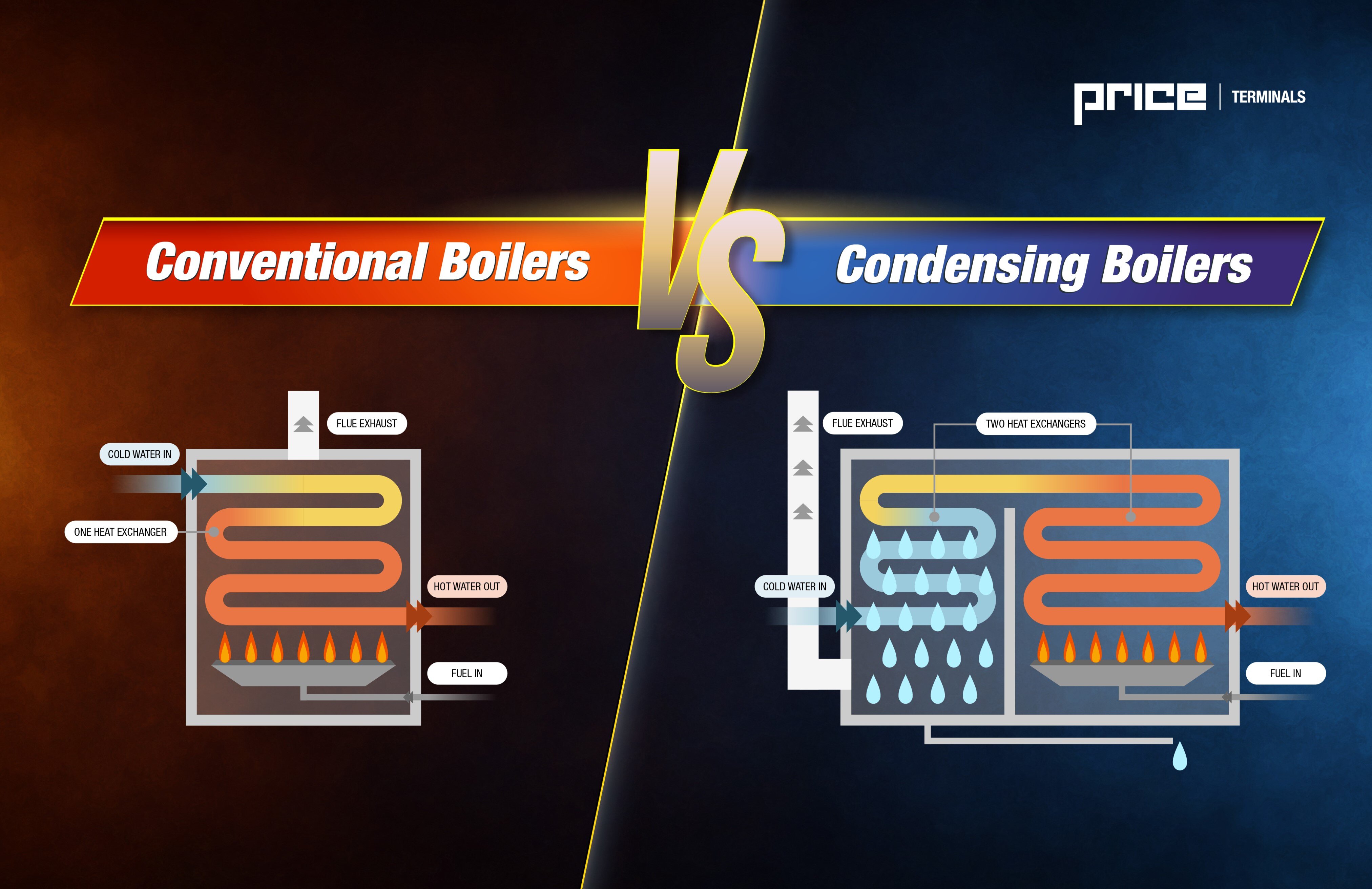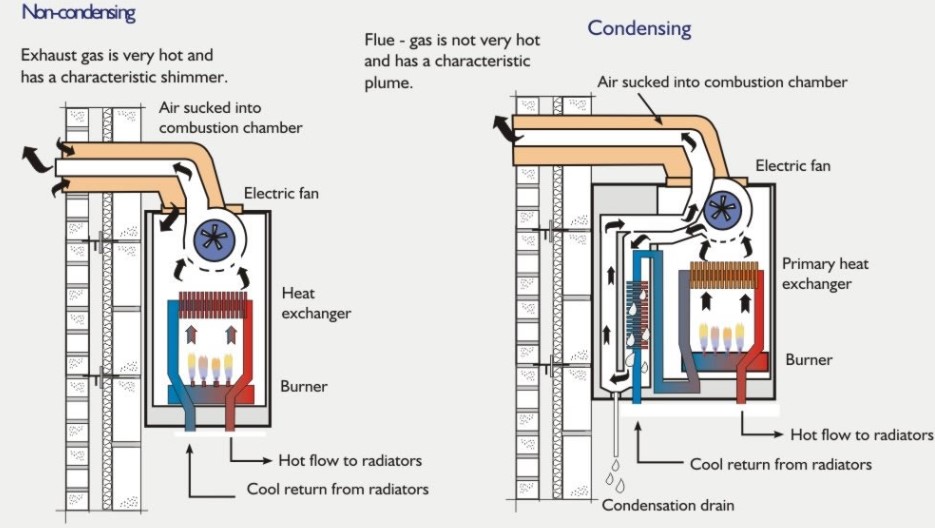Are you trying to decide between a condensing boiler and a non-condensing boiler for your home? This decision could impact your comfort, expenses, and even the environment.
Choosing the right boiler is not just about heating your home; it’s about optimizing energy efficiency and saving money. You might be wondering how these systems differ and which one is the best fit for your needs. Imagine slashing your energy bills while contributing to a greener planet.
Sounds appealing, right? Stay with us as we unravel the differences between these two types of boilers, helping you make an informed choice that aligns with your lifestyle and budget.

Credit: blog.priceindustries.com
Condensing Boilers Explained
Condensing boilers are a popular choice for many homeowners today. They are known for their efficiency and eco-friendly operation. They work by extracting heat from exhaust gases. This process reduces energy usage, making them efficient and sustainable. Understanding how these boilers work can help you make informed decisions.
How Condensing Boilers Work
Condensing boilers capture heat from exhaust gases. These gases would otherwise be lost in traditional boilers. A heat exchanger does this job efficiently. It cools the gases down, turning steam back into water. This process releases extra heat, which the boiler uses. This makes condensing boilers more efficient than non-condensing ones.
Benefits Of Condensing Boilers
Condensing boilers offer several advantages. They save energy, which can lower your bills. They also reduce carbon emissions, benefiting the environment. Their compact design fits well in small spaces. They operate quietly, offering peace and comfort at home. Their advanced technology also means fewer breakdowns.
Energy Efficiency In Condensing Boilers
Energy efficiency is a key feature of condensing boilers. They can achieve efficiency levels of over 90%. This means less fuel is needed to heat your home. They also adapt to different heating needs easily. This adaptability further improves their efficiency. With rising energy costs, their efficiency helps save money.
Non-condensing Boilers Overview
Non-condensing boilers are traditional heating systems. They provide heat without using the condensation process. These boilers have been in homes for decades. They are known for their simplicity and reliability. Many homeowners prefer them for straightforward heating.
Functionality Of Non-condensing Boilers
Non-condensing boilers heat water through combustion. They use gas or oil as fuel. The heated water then circulates through pipes. It warms radiators or underfloor systems. The exhaust gases exit through a flue. This process does not reuse heat from the gases. It leads to higher energy loss. Yet, it ensures steady heating.
Advantages Of Non-condensing Boilers
These boilers are less complex than condensing types. This makes them easier to maintain. They often cost less upfront. Installation can be simpler too. Some models fit older heating systems well. This allows homeowners to replace parts more easily. Many people find non-condensing boilers dependable.
Efficiency Factors In Non-condensing Boilers
Non-condensing boilers have lower efficiency. They lose heat through exhaust gases. This loss reduces their energy effectiveness. Yet, they still perform adequately. Regular maintenance can help improve their function. Checking seals and cleaning burners can boost efficiency. Keeping the system in good condition is essential.
Comparing Efficiency Levels
Choosing between condensing and non-condensing boilers can affect efficiency levels. Each type offers distinct advantages and drawbacks. Understanding these differences helps in making informed decisions about heating systems. Let’s explore their efficiency metrics, impacts on energy bills, and environmental considerations.
Efficiency Metrics
Condensing boilers achieve higher efficiency. They recycle heat from exhaust gases. This process minimizes heat loss. Non-condensing boilers release more heat waste. They operate at lower efficiency levels. Condensing models can reach efficiency rates of over 90%. Non-condensing often stays below 80%. This efficiency gap impacts overall performance.
Impact On Energy Bills
Higher efficiency translates to lower energy bills. Condensing boilers reduce fuel consumption. This results in significant savings over time. Non-condensing models require more energy. They lead to higher operational costs. Investing in a condensing boiler can pay off. Reduced energy usage cuts monthly expenses.
Environmental Considerations
Condensing boilers produce fewer emissions. Their efficient operation reduces carbon footprint. They conserve energy and contribute to environmental protection. Non-condensing boilers emit more pollutants. They have a larger environmental impact. Choosing a condensing boiler supports eco-friendly goals. It’s a step towards sustainable living.

Credit: berksinsulation.com
Cost Analysis
When choosing a boiler, understanding the cost implications is crucial. Both condensing and non-condensing boilers have unique cost considerations. This section will explore these differences.
Initial Costs Vs Long-term Savings
Condensing boilers often come with a higher price tag initially. They use advanced technology to increase efficiency. Non-condensing boilers are generally cheaper upfront. But they may not be as efficient.
Long-term savings are significant with condensing boilers. Their efficiency reduces energy bills over time. Non-condensing boilers might cost less at first. But they can lead to higher energy bills.
Installation Expenses
Installation costs vary for both types. Condensing boilers require more complex setup. This can lead to higher installation fees. They need a drainage system for condensate. Non-condensing boilers have simpler installations. They often cost less to install.
Maintenance And Repair Costs
Condensing boilers need regular maintenance. Their advanced parts may require more frequent checks. This can lead to higher maintenance costs. Non-condensing boilers are simpler machines. They often have lower maintenance expenses. But they may need more frequent repairs.
Each boiler type has its pros and cons. Understanding these can help in making a cost-effective choice.
Choosing The Right Boiler
Choosing between condensing and non-condensing boilers involves understanding efficiency and cost. Condensing models save energy by recycling heat from exhaust gases. Non-condensing boilers are simpler and cheaper but less efficient.
Choosing the right boiler is crucial for efficient home heating and can significantly impact your energy bills and comfort. Whether you’re considering a condensing or non-condensing boiler, understanding your specific needs is key. Let’s break down the essentials to guide you in making an informed decision.Assessing Home Heating Needs
Begin by evaluating your home’s heating requirements. Consider the size of your home and the number of occupants. A larger home with multiple bathrooms might benefit from a condensing boiler due to its efficiency and ability to handle high hot water demand. Think about your current and future heating demands. Are you planning to extend your home? A condensing boiler might be more suitable as it can adapt to increased heating needs. Reflect on your lifestyle and habits; if you have a busy household with simultaneous hot water usage, this could influence your choice.Space Considerations
Space is often a deciding factor in choosing the right boiler. Condensing boilers tend to be more compact and can fit in small utility rooms or even kitchen cupboards. This makes them ideal for homes with limited space. On the other hand, non-condensing boilers might require more room due to their larger size and ventilation needs. If you have ample space and prefer a simpler system, a non-condensing boiler might suit you better. However, consider future space requirements, especially if you plan any renovations or expansions.Expert Recommendations
Consulting with a heating expert can provide valuable insights tailored to your home. Experts can assess your current system and recommend the most efficient option. They often provide a cost-benefit analysis, helping you understand the long-term savings of a condensing boiler despite its higher initial cost. Remember, professional advice can uncover factors you might overlook. For instance, an expert might suggest a condensing boiler for its environmental benefits, which aligns with a sustainable lifestyle choice. Have you considered how your choice impacts your carbon footprint? Choosing between a condensing and non-condensing boiler isn’t just about immediate costs. It’s about aligning your choice with your home’s needs, future plans, and environmental values. Make sure your decision reflects what truly matters to you and your household.Technological Innovations
Boilers have seen many changes over the years. Modern technology has greatly improved their efficiency and functionality. This has led to the development of condensing and non-condensing boilers. Each type offers unique features and benefits. Understanding these innovations can help you make an informed choice.
Smart Boiler Systems
Smart boiler systems are becoming more popular. These systems use advanced technology to enhance user experience. They can connect to your home network. This allows you to control your boiler remotely. You can adjust settings with a smartphone or tablet. Smart systems also provide real-time energy usage reports. This helps you track and manage your energy consumption.
Future Trends In Boiler Technology
The future of boiler technology looks promising. Engineers are focusing on increasing efficiency and reducing emissions. Hybrid systems are gaining attention. These combine traditional boilers with renewable energy sources. Such systems aim to provide cleaner energy solutions. Researchers are also exploring new materials. These materials can withstand higher temperatures and pressures. This could lead to safer and more reliable boilers.
Energy-saving Features
Energy-saving features are critical in modern boilers. Condensing boilers are designed to be more efficient. They recycle heat from exhaust gases. This reduces energy waste and lowers heating costs. Non-condensing boilers are also improving. New insulation techniques are being used. These help to retain heat longer. Both types aim to reduce energy bills and environmental impact.

Credit: www.theexaminernews.com
Frequently Asked Questions
What Is A Condensing Boiler?
A condensing boiler captures heat from exhaust gases. This increases efficiency. It reduces energy costs and emissions.
How Do Non-condensing Boilers Work?
Non-condensing boilers heat water directly. They vent gases through a flue. Less efficient. Higher energy costs.
Are Condensing Boilers More Efficient?
Yes, condensing boilers are more efficient. They reuse heat from exhaust gases. Save money on energy bills.
What Are The Benefits Of Non-condensing Boilers?
Non-condensing boilers are cheaper to install. Simpler maintenance. Suitable for old heating systems. Less upfront cost.
Which Boiler Type Is Eco-friendly?
Condensing boilers are eco-friendly. Reduce carbon footprint. Use less energy. Better for the environment.
Conclusion
Choosing the right boiler is crucial for home comfort. Condensing boilers save energy and reduce bills. They are efficient and eco-friendly. Non-condensing boilers cost less upfront but use more energy. Consider your budget and energy needs. Both types have pros and cons.
Consult a professional before deciding. It’s important for safety and efficiency. Investing in the right boiler pays off in the long run. Keep your home warm and your energy bills in check. Make an informed choice for peace of mind.





